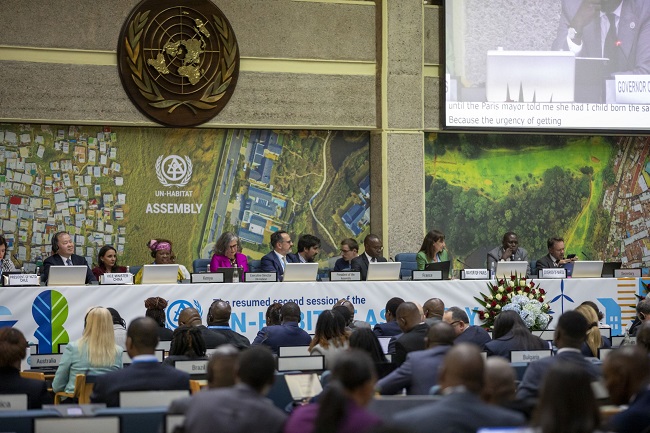The United Nations Habitat Assembly has adopted UN-Habitat’s Strategic Plan for 2026–2029, placing adequate housing, land, basic services, and the transformation of informal settlements and slums at the heart of global efforts to build inclusive, climate-resilient, and sustainable cities.

The adoption – by a strong majority vote of 105 in favour – marks a milestone in the fight against the growing global housing crisis and sets the direction of the Programme’s work over the next four years.
The strategic plan was endorsed during the resumed second session of the United Nations Habitat Assembly, which brought together ministers, local authorities, civil society, and other key stakeholders. It outlines a clear path to support Member States in expanding access to land and housing, improving basic services, and fostering inclusive prosperity and climate resilience in cities worldwide.
“An estimated 2.8 billion people worldwide are affected by different forms of housing inadequacy. The pandemic and inflation have opened the doors to the worst housing affordability crisis in more than a decade. The plight of 1.1 billion people living in informal settlements and slums and more than 300 million homeless people, in particular, calls for urgent and effective collective action,” said Anacláudia Rossbach, Executive Director of UN-Habitat.
“This is why UN-Habitat’s strategic plan 2026–2029 prioritizes housing, land, and basic services for all. Without access to adequate housing, dignity and development are out of reach for billions. We must act urgently, boldly, and together,” added Rossbach.
A global priority rooted in rights
By 2050, 68 per cent of the world’s population will live in cities – driving the need for at least 40 million new homes, especially in sub-Saharan Africa and parts of Asia.
Housing deficits are especially acute in regions experiencing rapid urban growth. Asia, with over 842 million homes, still faces a shortfall of more than 100 million units. Africa has over 190 million homes but a deficit of 70 million, reflecting deep under-provision, particularly in informal settlements where basic services are lacking. In sub-Saharan Africa, 53.6 per cent of urban residents live in slums – the highest rate globally – and the region could see an additional 360 million people living in these conditions by 2030 if action is not taken.
Through access to housing, land and basic services, UN-Habitat aims to have an impact on three major global challenges:
- Equitable and inclusive prosperity for poverty eradication
- Preparedness, response, recovery and reconstruction
- Environment and climate action
These areas reflect the urgent need for integrated urban solutions that link housing with livelihoods, climate resilience, and peacebuilding.
Housing as the foundation of development
The Assembly also held a high-level dialogue on adequate housing during its resumed session. Co-chaired by Kenya and France, the session showcased political commitment and featured ministers, city leaders, civil society, and housing experts who shared good practices and innovative policies.
“Housing is a catalyst for social inclusion, equality, and sustainability,” said Anne Hidalgo, Mayor of Paris. “It is urgent to see cities not as a local issue, but as a global lever – for climate action, for social justice, and for achieving the Sustainable Development Goals.”
“Housing is extremely important in any society, especially societies with inequalities,” said Sakaja Arthur Johnson, Governor of Nairobi City County. “Housing is at the top of our agenda because we want to give our people dignity, we want them to be able to have hope.”
Participants reaffirmed that adequate housing is not just a roof over one’s head but the foundation for safety, health, and opportunity. They called for rights-based housing policies, scalable financing mechanisms, and stronger partnerships with communities, the private sector and international development banks.
The session also highlighted progress made under the resolution on adequate housing for all, which led to the establishment of the Open-Ended Intergovernmental Working Group on Adequate Housing for All and a global Adequate Housing Platform. Both initiatives will support the implementation of UN-Habitat’s Strategic Plan through evidence-based policy guidance and global collaboration.
Moving from vision to action
UN-Habitat will support governments and partners through integrated action on planning, finance, governance, innovation, and capacity-building. The strategic plan provides a roadmap to accelerate impact, align with the 2030 Agenda for Sustainable Development, and respond effectively to overlapping crises – from climate shocks and conflicts to economic instability.
The United Nations Habitat Assembly, the highest global decision-making body on sustainable urbanisation, is composed of all 193 UN Member States and meets every four years to determine strategic directions for the organisation.
